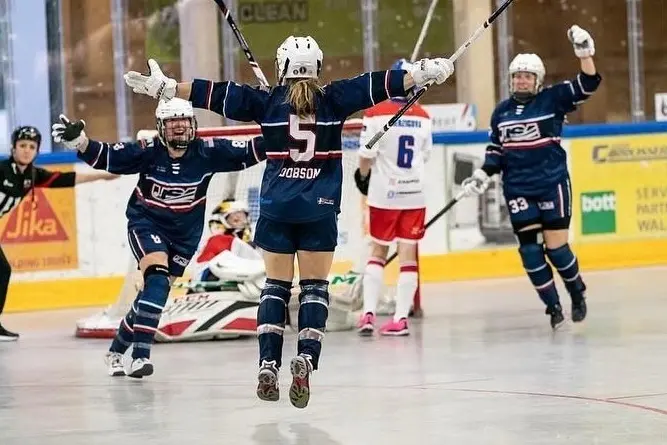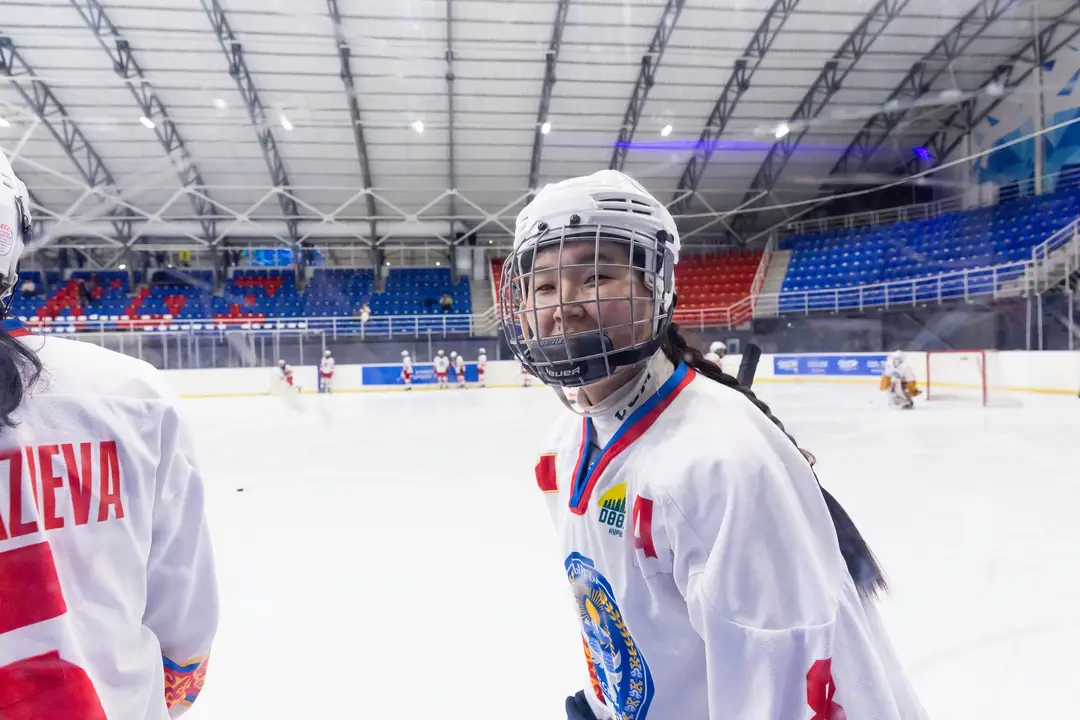
One of the pioneers for women’s ice hockey in the United States, the 1998 Nagano Winter Games allowed the sporting public to catch up to the brilliance of Sue Merz. Having participated in the inaugural IIHF Women’s Worlds in 1990, along with a sterling career at the NCAA level with the New Hampshire Wildcats, the chance to don the stars and stripes at Nagano allowed Merz the treasured chance to make history twice.
A veteran of six IIHF Women’s World Championships and two Winter Games by the time she hung up her skates, Merz was more than a reliable blueliner, she was an essential component to building the game in the United States, part of a group of inspiring role models whose heroics encouraged an unprecedented number of girls to take up the game. In reflection, Merz’s journey nearly came to a shocking and abrupt end. Weeks prior to the 1997 edition of the Women’s Worlds in Kitchener, Ontario, Merz had been released from the team.
Approaching a career crossroads, Merz refused to wallow in self-pity and get trapped in a downward spiral of despair. In the aftermath of Kitchener, which saw the US force overtime against host country Canada in a silver medal outcome, there was a heightened sense of motivation to engage in a compelling comeback. Proving that hard work pays off, Merz employed a combination of focus, perseverance and resilience while training full-time in the hockey hotbed of Boston, regaining a spot on the US national team, a heroic return that validated her admirable sacrifices.

“It was probably a combination of stubbornness to show the coach that he made the wrong decision in cutting me and the determination to get in better shape to give myself the chance to make the team. I moved to Boston to train with Mike Boyle at BU (along with a majority of the athletes). Best decision I could have made. It was a feeling of redemption, joy, shock and confirmation of the hard work that was put in.”
Appearing in all of Team USA’s games at Nagano, Merz would have to wait until her second game to place her name on the scoresheet. With said game involving a February 9, 1998 tilt against Sweden, she would hit her stride offensively. With Laurie Baker’s first period goal, providing the US with a 1-0 advantage, Merz would gain the milestone of her first Olympic point.
During a six-minute span in the second stanza, which saw the US record four goals, placing the game out of reach, Merz would record a pair of points. Collaborating with Tara Mounsey, as both earned the assists on Karyn Bye’s power play marker, Merz would score unassisted at the 16:20 mark. One of nine different players from the US to register at least one point against Sweden, she would emerge as the game’s top scorer with three points, part of a convincing 7-1 triumph.
As the preliminary round progressed, Merz’s would find her name on the scoresheet in a pair of other games. In a 4-2 final against Finland, which involved seven members of the US contributing points, Merz and Bye logged assists on Tara Mounsey’s second period power play tally. The following day, a 10-0 triumph versus host country Japan, a first period goal scored by A.J. Mleczko saw Merz post her fourth assist of the tournament.
The fifth and final point representing Merz’s mesmerizing run in Nagano would also stand as the biggest of her career. With Canada and the US renewing rivalries in the gold medal game at Big Hat Arena, February 17, 1998 would emerge as the turning point in the modern history of women’s ice hockey, introducing the game to an unprecedented number of fans, while prompting thousands of women throughout North America to grace the ice themselves.
After a tense first period which resulted in a 0-0 defensive stalemate, the US would grab the first lead in a highly anticipated gold medal game. Merz and Sandra Whyte would be credited with Gretchen Ulion’s power play goal at the 2:38 mark. Coincidentally, Ulion and Whyte would gain the assists on the second goal of the game for the US, which was also scored on the power play. Although Canada’s Danielle Goyette would snap Sarah Tueting’s bid for a shutout with less than five minutes remaining, Whyte would score into an empty net with eight seconds remaining, the game clearly out of reach.
As evidenced in the gold medal game, capitalizing on power play opportunities was the key factor in the US vanquishing its Canadian rivals, avenging four straight silver medals from 1990 to 1997 in the IIHF Women’s Worlds. Perhaps more impressive was the fact that the US was undefeated in seven games, accentuating its gold medal by becoming the first undefeated team in women’s ice hockey at the Winter Games.
“Our power-play that Olympics was dominant. We scored a majority of our big goals off of our pp. We also had the mindset that the games during the Olympics weren’t any different than any others outside of that tournament, so that assist wasn’t any different than any other assist during that season. What I mean is that we all began contributing to the gold medal in September of that season, not just in February.”
While the modern contemporaries of the US national team look to capture the first Winter Games gold since Nagano, the achievements of competitors like Merz are certainly a source of inspiration. Undoubtedly, a gold medal in 2018 would be an outstanding way to pay tribute to their predecessors, helping to bridge generations while commemorating the 20th anniversary of the gold, one of the most important moments in the history of female sport in America.

Understandably, Nagano seems like yesterday for so many that were part of this defining moment for the game, which certainly includes Merz. As prestigious as the gold medal was, the only honor that may eclipse such an attainment for Merz and her teammates was the fact the entire roster from the Nagano Winter Games was named to the United States Hockey Hall of Fame.
Along with entry to the Fairfield County Sports Hall of Fame, Merz is also an inductee in the New Hampshire Wildcats Hall of Fame, where she is joined by other hockey legends that also includes Erin Whitten, the first goalie to win a professional men’s ice hockey game, plus Brandy Fisher, the first-ever recipient of the Patty Kazmaier Award.
Perhaps more impressive is the fact that the Wildcats have named numerous awards in the honor of former program stars, including Merz. Team honors include the Karen L. Bye Award (Team MVP), Colleen Coyne Award (Top Defensive Player), Tricia Dunn Award (Most Improved Player), while the Sue Merz Award recognizes the Seventh Player Award. Sara Carlson is one of the most celebrated recipients of the Award, earning the honor thrice.

Such recognition reflects the type of moments that preserve Merz’s sporting impact, simultaneously immortalizing her achievements. That coveted sense of immortality was one that reached euphoric heights for Merz as the induction ceremony into the US Hall was validation that women’s hockey is of cultural and sporting relevance. Feeling a tremendous sense of prestige in the knowledge that the accomplishments of Nagano stands as one of hockey’s great hallmarks, it would be a great honor for her if the US could duplicate that feat once again in 2018, bookending an influential time in the history of the fantastic female game.
“The US HHOF was a great honor for the team, and we were very honored to be inducted! It is crazy to think that the gold medal happened 20 years ago! It really doesn’t make any sense! It means that time waits for no one….even those who fight it! Our team is looking forward to getting together to celebrate the accomplishment along with cheer on this year’s team in their quest for the gold medal.”
Following Nagano, Merz would become intertwined with the game’s cultural fabric north of the border. With the launch of the original NWHL, Merz became one of the first Americans to compete. Joining the Brampton Thunder of the Greater Toronto Area, rivalries melted, replaced by friendship, as she called luminaries such as Jayna Hefford and Vicky Sunohara (who also competed at the 1990 IIHF Women’s Worlds) as teammates.
For these distinguished competitors, Toronto also offered a pair of opportunities to renew a respected rivalry. From the outset, Merz donned the Stars and Stripes in the TSN Challenge, the first-ever women’s ice hockey game contested at Toronto’s Air Canada Centre. Gracing NHL ice in one of hockey’s most lauded cities was followed just a few months later by the 2000 IIHF Women’s Worlds, which were contested in the neighboring community of Mississauga, Ontario.
Through it all, the enthused hockey fans in Brampton appreciated and admired Merz for her superlative skills, allowing her the chance to expand a role as a tremendous ambassador for the game. Merz would be part of an amazing legacy of American-born stars who made their mark with the Brampton Thunder. Among them included Kathleen Kauth and Molly Engstrom, who would score the championship clinching goal in the inaugural CWHL playoffs in 2008.
Worth noting is the fact that Merz was also part of a much richer narrative, as this fascinating yet underappreciated element of the game’s modern history saw numerous other American stars bring their talents to Canadian clubs. Both the NWHL and the subsequent Western Women’s Hockey League would see the likes of Cammi Granato grace the ice with the Vancouver Griffins, Angela Ruggiero with the Montreal Axion (pronounced Action), and Karen Thatcher with the BC Breakers, among others.

The more recent years of CWHL play involved Megan Bozek with the Toronto Furies while Julie Chu became the first American player to win a Clarkson Cup with a Canadian team, achieving the feat with the Montreal Stars in 2011, the first of three Cup wins with the franchise. Not to be forgotten during this time was Merz, who would also gain the chance to return to the ice at Toronto’s Air Canada Centre, truly bringing her unforgettable hockey journey full circle. Suiting up for the USA Legends at the Legends Classic Hockey Game in 2010, part of the Hockey Hall of Fame festivities during induction weekend, two of Merz’s US teammates, Granato and Ruggiero are also in the Hall, enriching the legacy of Nagano,
“I played in Canada prior to and after Nagano, so I had already been teammates with Jayna, Vicky Sunohara, Karen Nystrom, Lori Dupuis, etc. We were all friends when we got to the Nagano Olympics. They are all great people and great athletes. I learned so much from playing in Canada during my Olympic run. It was one of the best decisions I made for my career.”
“All quotes obtained first hand unless otherwise indicated”
Photo credits: Helen Neafsey and Bruce Bennett, Getty Images
Other images obtained from:
http://fairfieldcountysports.com/about-fcsc/hall-of-fame-members/
[adrotate group=”1″]
Related Articles
Categories
Recent Posts
[adrotate group=”2″]




